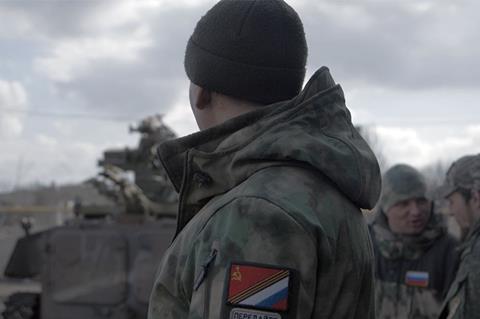
Toronto International Film Festival (TIFF) CEO Cameron Bailey has said his staff received hundreds of abusive emails and calls including threats of sexual violence from parties opposed to the controversial documentary Russians At War.
Speaking on Tuesday to an audience at TIFF Lightbox, which hosted two postponed, post-festival presentations of Anastasia Trofimova’s film, Bailey spoke of the reaction by members of the public against the film, which snowballed after last week’s press and industry screening.
On that occasion dozens of protestors bearing Ukrainian flags and placards assembled outside Scotiabank and branded the film Russian propaganda. Filmmaker Trofimova embedded with Russian troops headed for the frontline in the war against Ukraine as they discuss mortality and family, and reconsider what they were told about the war.
Amid accusations of propaganda and outrage from protestors including members of Toronto’s Ukrainian community who said the film humanised their country’s military aggressors, TIFF initially stood by three public screenings scheduled for last Friday, Saturday and Sunday. A day later they postponed them, citing “significant threats to festival operations and public safety”.
On Tuesday protestors gathered again outside TIFF Lightbox. Inside the theatre, two days after the festival ended, Bailey told the audience that while most communications to staff had been civil, some were “terrifying” and staff were “understandably frightened”. The CEO added that he and his team learned of plans to disrupt and possibly stop last week’s scheduled screenings. The Hollywood Reporter first reported Bailey’s comments.
Russians At War, backed in part by public funds, has become something of a political football. Last week it drew the ire of Canada’s deputy prime minister Chrystia Freeland and others in political and diplomatic circles.
Freeland, speaking on the same day that protestors gathered last Tuesday, said she shared the concerns of Ukrainian diplomats and the Ukrainian-Canadian community, adding: “We as a country have to be very, very clear: there can be no moral equivalency in our understanding of this this conflict. It’s not right for Canadian public money to be supporting a screening and production of a film like this.”
It is unclear if Freeland has seen the film. Since the first screening, Russians At War has been roundly praised as an anti-war film by journalists at Canadian outlets who have seen it. Russian-Canadian filmmaker Trofimova said she did not receive permission from Russian authorities to embed with Russian troops. She has rejected allegations that her film is Russian propaganda and has denounced the Russian invasion as illegal.
TIFF has also denied the film is Russian propaganda. On Tuesday Bailey said bowing to public or government pressure over presenting cultural products can become a “corrosive force” in society. He reiterated TIFF statements that the France-Canada co-production was subjected to a rigorous selection process, and pointed out that recent editions of the festival have shown several documentaries by Ukrainian filmmakers related to the war.
Freeland’s office had not replied to Screen’s request for comment at time of writing.

























No comments yet